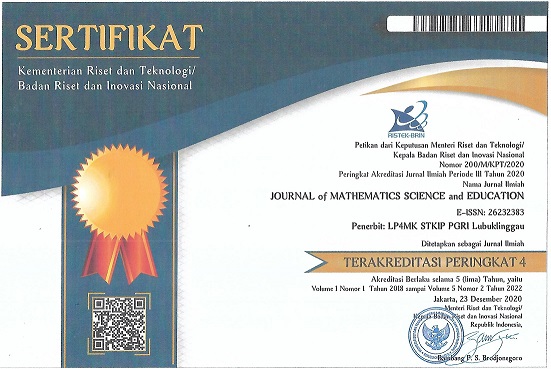PENINGKATAN KEMAMPUAN BERPIKIR KRITIS MATEMATIS SISWA DENGAN MENGGUNAKAN PENDEKATAN PROBLEM POSING
Abstract
The purpose of the study was to determine how the problem posing approach in learning mathematics can improve mathematical critical thinking skills. This type of research is Quasi experimental with Post Test Only Control Group design. The population in this study were VIII grade students of SMP Negeri 12 Bandar Lampung. The cluster random sampling method was used to select sample members from the population without considering the students' ability level. The results showed that the problem posing approach with steps to create mathematical situations, formulate mathematical questions, solve mathematical problems, and apply mathematical concepts has a relationship with indicators of mathematical critical thinking skills. Indicators of critical thinking skills include interpretation, analysis, evaluation, inference, explanation, and self-regulation. So, it can be concluded, students' mathematical critical thinking skills can be improved using the problem posing approach.
References
Bonotto, C. (2013). Artifacts as sources for problem-posing activities. Educational Studies in Mathematics, 83(1), 37–55. https://doi.org/10.1007/s10649-012-9441-7
Chen, T., & Cai, J. (2020). An elementary mathematics teacher learning to teach using problem posing: A case of the distributive property of multiplication over addition. International Journal of Educational Research, 102(March), 1–11. https://doi.org/10.1016/j.ijer.2019.03.004
Daryati, D., Nugraha, & Sutarni, N. (2018). Pengaruh penggunaan metode problem posing terhadap kemampuan memecahkan masalah. Jurnal Pendidikan Ilmu Sosial (JPIS), 27(1), 31–42.
Facione, P. a. (2011). Critical Thinking : What It Is and Why It Counts. Insight Assessment, ISBN 13: 978-1-891557-07-1., 1–28. https://www.insightassessment.com/CT-Resources/Teaching-For-and-About-Critical-Thinking/Critical-Thinking-What-It-Is-and-Why-It-Counts/Critical-Thinking-What-It-Is-and-Why-It-Counts-PDF
Juano, A., & Pardjono, P. (2016). Pengaruh Pembelajaran Problem Posing Terhadap Kemampuan Berpikir Kritis Dan Komunikasi Matematis Siswa Kelas V Sd. Jurnal Prima Edukasia, 4(1), 46. https://doi.org/10.21831/jpe.v4i1.7801
Kholili, A., Shoffa, S., & Soemantri, S. (2021). Pembelajaran Matematika Model Discovery Learning Terhadap Kemampuan Berpikir Kreatif Siswa: Kajian Meta Analisis. JPMI: Jurnal Pembelajaran Matematika Inovatif, 4(6), 1441–1452. https://doi.org/10.22460/jpmi.v4i6.1441-1452
Kurnia, I., & Caswita. (2020). Students’ critical thinking ability in solving contextual problems at a junior high school. Journal of Physics: Conference Series, 1521(3). https://doi.org/10.1088/1742-6596/1521/3/032067
Meutia, H., Sulastri, R., & ... (2017). Pendekatan Problem Posing dalam Meningkatkan Kemampuan Berpikir Kreatif Siswa SMA di Kota Banda Aceh. Seminar Nasional USM, 1, 119–123. http://ojs.serambimekkah.ac.id/semnas/article/viewFile/366/333
Paridjo. (2000). Sebuah solusi mengatasi kesulitan belajar matematika. Jurnal Formatif, 80–100.
Sari, D. P. (2016). Penerapan Pendekatan Problem Posing Dalam Meningkatkan Pemahaman Siswa Kelas IX SMP Negeri 6 Medan Pada Bangun Ruang Sisi Lengkung Tabung Dan Kerucut. MES (Journal of Mathematics Education and Science), 2(1), 33–40.
Shanti, W. N., Sholihah, D. A., & Martyanti, A. (2017). Meningkatkan Kemampuan Berpikir Kritis Melalui Problem Posing. LITERASI (Jurnal Ilmu Pendidikan), 8(1), 48. https://doi.org/10.21927/literasi.2017.8(1).48-58
Shriki, A. (2013). A Model for Assessing the Development of Students’ Creativity in the Context of Problem Posing. Creative Education, 04(07), 430–439. https://doi.org/10.4236/ce.2013.47062
Silver, E. A., & Cai, J. (1996). An analysis of arithmetic problem posing by middle school students. Journal for Research in Mathematics Education, 27(5), 521–539. https://doi.org/10.2307/749846
Suryawan, I. P. P., Sudiarta, I. G. P., & Suharta, I. G. P. (2023). Students’ Critical Thinking Skills in Solving Mathematical Problems: Systematic Literature Review. Indonesian Journal Of Educational Research and Review, 6(1), 120–133. https://doi.org/10.23887/ijerr.v6i1.56462
Suryosubroto. 2009. Proses Belajar Mengajar. Jakarta: PT Rineka Cipta.
Yeni, E. M. (2015). Kesulitan Belajar Matematika Di Sekolah Dasar. Jupendas: Jurnal Pendidikan Dasar, 2(2), 1–10. jfkip.umuslim.ac.id

This work is licensed under a Creative Commons Attribution-NonCommercial-ShareAlike 4.0 International License.

This work by Journal of Mathematics Science and Education is licensed under a Creative Commons Attribution-NonCommercial-ShareAlike 4.0 International License.

















